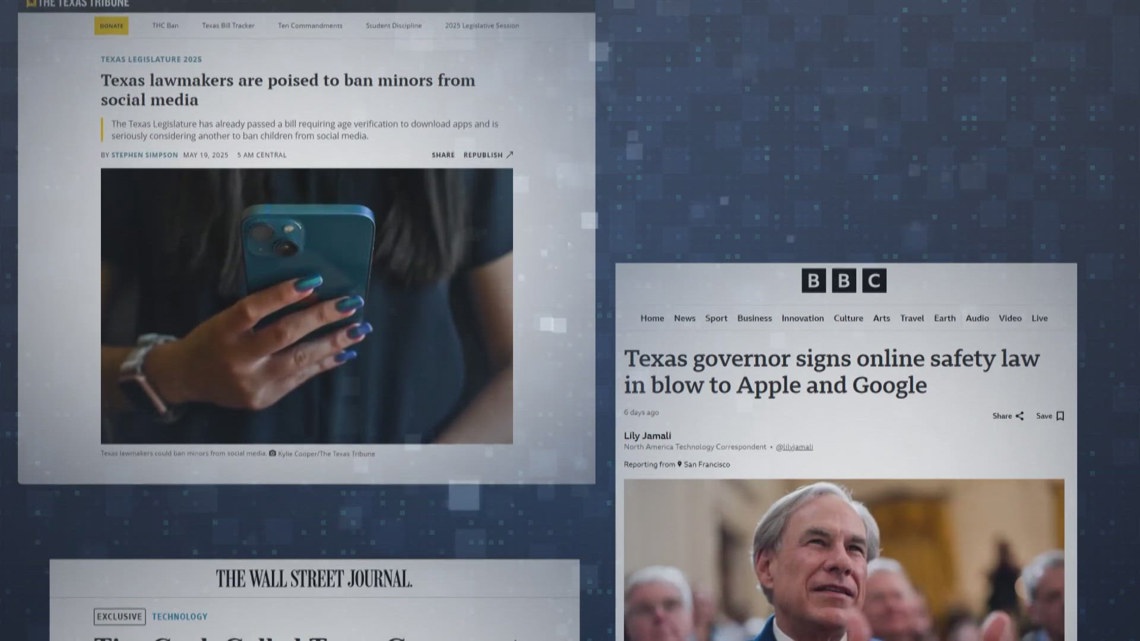
Texas lawmakers passed digital child safety laws last session, but free speech advocates predict court challenges over First Amendment concerns.
TEXAS, USA — Many Texas legislators said online child safety was a top priority during this recent legislative session, but will their efforts hold up in court?
During the last session, legislators passed age verification legislation called the App Store Accountability Act, requiring Google and Apple to verify app store users’ ages. Governor Greg Abbott signed the bill into law at the end of May.
Another proposed bill, HB 186, would have prohibited minors from accessing social media without parental permission but procedural issues kept it from passing.
Both pieces of legislation enjoy support from politicians on both sides of the aisle and digital safety advocates.
“We should be constructing physical and digital spaces that are designed with children in mind,” says Chris McKenna, CEO of Protect Young Eyes. “That to me, is just a general principle that I think should be true wherever children are spending time.”
McKenna argues this legislation helps protect kids from online harms like cyberbullying, pornography, or access to adult predators.
“Instead of the app stores simply being a marketing mechanism that wants you to download, it should be an educational and informational place where parents can make a decision on whether or not that app is appropriate for their child,” McKenna says.
But free speech advocates say these efforts run afoul of the Constitution and so far the courts seem to agree. At issue: The First Amendment. Children enjoy many of the same free speech protections as adults and many pieces of social media-focused legislation haven’t met the strict scrutiny required to limit those freedoms.
“The courts that have examined these kinds of laws, the social media access laws in particular, no court has upheld it as constitutional,” says Ari Cohn, lead counsel for tech policy at the Foundation for Individual Rights and Expression. “And several courts have said, no, this is unconstitutional. This is a violation of the First Amendment.”
Just last fall, a federal judge blocked a new Utah law that would have forced social media companies to verify user ages. And Cohn predicts a similar fate for Texas’ legislation, saying these issues are ultimately headed to the Supreme Court. He argues that online digital safety for kids is a shared goal but requires solutions that don’t limit speech.
“I think once this first wave is over and the Supreme Court says ‘this isn’t how we do it here,’ I think maybe legislators will pull back,” he says. “I think after this first wave kind of gets kicked back by the courts, we’re going to see a little bit more introspection. I think it’s vital to get it right, because otherwise, we go through this four-year process during which nothing has been in effect and no kids have been protected.”
While Chris McKenna supports digital child safety legislation, he says parents are ultimately the ones who are most responsible for what their kids consume and shares advice for how to protect kids online. He recommends parents:
- Assess a child’s development to decide if they’re ready for a smartphone and which age-appropriate apps they can use
- Follow the Seven-Day Rule: Download any app and use it for seven days BEFORE giving a child access
- Maintain insight into online safety by keeping those apps on a parent’s phone and continue using it as a child might
Though no legal challenges have been filed yet, experts predict big tech companies and free speech advocates will push back on Texas’ new digital child safety laws. But McKenna says parents don’t have to wait to become the first line of defense when it comes to protecting their kids online.
“There’s no passive parenting in the digital age. You’ve got to be engaged and informed and involved. This is what it takes today,” McKenna said. “There are resources, many out there that can help, and we want to come alongside. But you can do it.”
